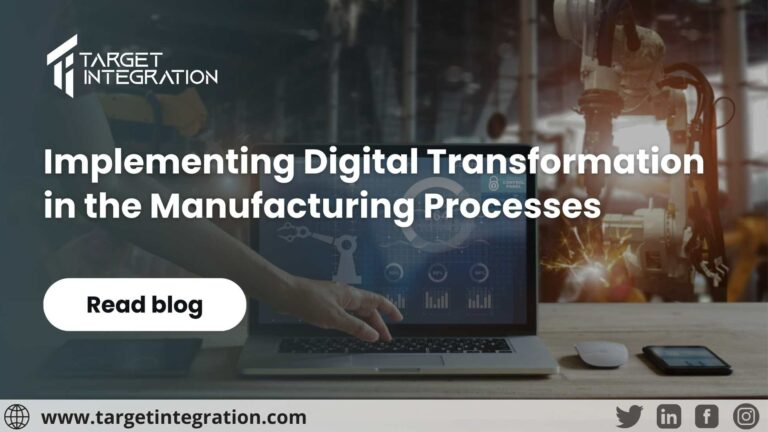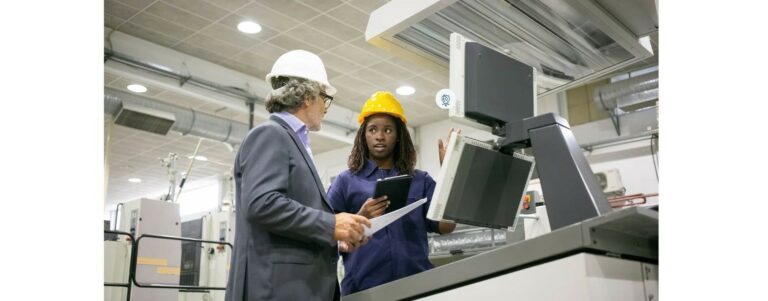The impact of embracing digital transformation in the manufacturing industry is truly astounding. It doesn’t matter if you’re in the business of selling high-precision machinery or construction materials online; technology offers a multitude of ways to enhance your operations. These digital tools and techniques are like a helping hand for manufacturers, enabling them to boost efficiency and streamline various aspects of their operations, ranging from product development to supply chain management.
The benefits of advanced manufacturing technologies are numerous. They empower companies to explore new digital business models, adapt to changes more swiftly, and even forecast shifts before they happen – all of which are vital in the world of manufacturing. It’s no wonder that the International Data Corporation (IDC) predicts that by the close of 2022, half of all manufacturing firms will have invested in enhancing their resilience, data analytics, and artificial intelligence capabilities to drive intelligent manufacturing.

As the digital landscape continues to evolve and expand, this article aims to address some important questions about smart manufacturing. We’ll explore what digital transformation means in the manufacturing context and the technologies powering this transformation. We’ll also delve into why it’s such a critical undertaking for businesses. Additionally, we’ll uncover the barriers that may be deterring companies from embarking on this digital transformation journey and provide insights on how they can prepare to take the leap into this exciting realm of possibilities.
What does Digital Transformation in the Manufacturing Sector mean?
In the realm of manufacturing today, digital transformation signifies the process of augmenting traditional manufacturing methods, products, and workforce through the integration of digital technologies. These technologies encompass a range of innovations such as automation software, eCommerce systems, sensors, industrial robots, and more.
The primary objectives of digital transformation in manufacturing are as follows:
- Enhance operational efficiency, reduce operational costs, and optimize revenue generation.
- Elevate the quality of manufactured products.
- Streamline customer interactions to enhance the overall customer experience, particularly in simplifying the ordering process.
- Bolster decision-making capabilities through data-driven insights.
- Enable swift adaptation to change in customer demands and market dynamics, securing a competitive edge in a dynamic landscape.
Manufacturing is in a constant state of flux due to the volatility of the global economy and shifting policy landscapes. Furthermore, the pandemic significantly impacted many manufacturing enterprises, necessitating rapid adaptation to ensure their survival.
Beyond these transformative shifts, several technological advancements are poised to disrupt the sector. The expanded networking capabilities of 5G, the surge of the Internet of Things (IoT), the advent of Industry 4.0, the integration of machine learning, and the adoption of data-driven predictive analytics are all making a profound impact on manufacturing. These developments have given rise to the concept of “smart factories,” marked by heightened efficiency and sustainability.
Another driving force behind the digital transformation of manufacturing is the evolving expectations of customers and the resolution of customer pain points. With the introduction of e-commerce for manufacturers, Customer Relationship Management (CRM) systems, Enterprise Resource Planning (ERP) platforms, and manufacturing execution systems, customer data is more transparent than ever before. This heightened visibility makes it increasingly challenging to overlook poor customer experiences.

Challenges of Digital Transformation in Manufacturing
In any industry, manufacturers often encounter obstacles that hinder their progress in digital transformation. These hurdles may include the need to gain upper management’s approval or concerns about resource allocation.
However, initiating discussions on digital transformation can help manufacturers gain a transparent understanding of their inefficiencies and resource management processes. It also opens opportunities for the adoption of new technologies.
- The implementation of any digital transformation initiative can place demands on the IT department’s technology infrastructure and development framework. This may involve the adoption of new release cycles, processes, APIs, and innovations in various aspects of digital infrastructure and performance.
- Digitalization in the manufacturing sector comes with human resource costs, as employees may feel disoriented due to changing workplace dynamics and requirements. Employee reluctance and communication challenges can present hurdles for manufacturers.
- Given the ever-evolving and financially sensitive nature of the manufacturing industry, manufacturers must prudently address budget and investment constraints. This caution can lead to reservations about committing to a digital transformation strategy for their factories.
- Manufacturing operations are intricate, and characterized by tight schedules and numerous resource constraints. As a result, management is often reluctant to tolerate any adverse impacts on operations before witnessing the benefits brought about by their digital transformation efforts.
Despite the challenges involved in embarking on a digital transformation journey, manufacturers do not have to go through it alone. There are numerous digital transformation consultants and advisory services available to support them in their endeavours. Furthermore, numerous success stories and case studies in digital transformation within the manufacturing sector demonstrate how businesses have effectively harnessed the potential of smart manufacturing.
Instances of Digital Transformation in Manufacturing
In the manufacturing industry, digital transformation goes beyond simply automating assembly lines, improving inventory tracking, or optimizing the supply chain. It encompasses a shift in mindset, approaches, and the adoption of innovative problem-solving methods. Here are some illustrations of how manufacturers can derive benefits from digital transformation strategies:
E-commerce
Traditional B2B sales can be challenging, but adapting to the needs of contemporary business buyers is essential. To achieve this, companies can implement a B2B eCommerce solution, creating a user-friendly platform where customers can effortlessly search, place orders, and track their purchases. This digitization through eCommerce can be beneficial, significantly enhancing the online presence, with an impressive increase in web traffic.
Big Data and Data Analytics
The impact of big data in manufacturing is substantial. Notably, General Electric increased production capacity by up to 20% while reducing material consumption rates by 4% through the implementation of machine learning alone.
IoT (Internet of Things)
IoT, complemented by cloud systems like Microsoft Azure, enables companies like Tetra Pak to leverage real-time data for precise predictions about the maintenance needs of their dairy processing equipment. Additionally, the efficient processing of data from wearable devices plays a critical role in workforce productivity. Collaborative efforts between Honeywell and Intel, such as the Connected Worker Proof of Concept, merge sensor data with worker-worn devices to achieve this goal.
Advanced Manufacturing Technologies
Innovative manufacturing methods, including additive manufacturing, empower manufacturers to overcome the limitations of traditional production processes. For example, in the automotive sector, Ford harnesses additive manufacturing to produce polymer spare parts for its vehicles at a faster pace than conventional moulding processes would permit.

The Leading 8 Trends in Digital Transformation in Manufacturing
Let’s gain insight into the prominent digital transformation trends in the manufacturing sector during the 2020s and explore their roles in shaping the industry’s future.
Industry 4.0
Industry 4.0 characterizes the convergence of conventional manufacturing, industrial facilities, and smart technology across the value and supply chains. Often termed “the fourth industrial revolution,” its primary aim is to achieve complete automation of production processes, with real-time digital control. An illustration of this fourth industrial revolution is a machine embedded with sensors that can interact with another machine based on data received through these sensors, all without human intervention. In the future, Industry 4.0 could blur the boundaries between physical and virtual warehouses, freeing up staff for more collaborative tasks.
IoT (Internet of Things)
An integral component of Industry 4.0 is the Internet of Things (IoT), a network of interconnected physical objects communicating using data and environmental inputs, including external data sources. Embracing IoT can result in enhanced functionality, insights, services, and advantages for manufacturers. Prominent IoT applications include operational improvements, asset management, and workforce management. For instance, real-time monitoring enables predictive maintenance programs, intelligent air quality management enhances energy efficiency and working conditions, and IoT aids in risk management and workforce productivity.
Machine Learning
With the abundant data collected by machines, algorithms can swiftly determine optimal actions among multiple choices, an efficiency that surpasses human capabilities. Machines today demonstrate that efficiency doesn’t compromise quality; they can meticulously identify and anticipate factors affecting production, assembly line speed, and quality. Machine learning applications encompass suggesting optimal courses of action for employees, predicting wait times, shipping times, and behavior models for supply chain risk prevention. Furthermore, machine-generated data provides insights across the entire production process when integrated into the supply chain.
Robotics
While future robots in manufacturing may resemble their present counterparts, advancements will emerge in learning from previous behaviours and employing pattern recognition to enhance results. The growth of connected devices, their interactions, and data volumes are all expected to increase. In this connected environment, robotics will continue to evolve, particularly in areas such as autonomous driving, dexterous handling, and movement. As robots become more autonomous, flexible, and cooperative, they will undertake increasingly complex tasks, alleviating employees from repetitive duties and bolstering factory floor productivity.
B2B eCommerce
Modern B2B eCommerce platforms are adapting to rapidly changing B2B buyer expectations, which increasingly mirror those of B2C consumers. Preserving B2C-like experiences becomes challenging as B2B customers require customized checkout processes, pricing rules, personalized product data, and other intricate functionalities running seamlessly in the background. Noteworthy examples of successful digital transformation in manufacturing are exemplified by companies like Promowear and KB Combustion, who transformed their stores using Odoo. This transformation allowed them to consolidate their digital presence into a single website, facilitating segmentation and multichannel capabilities while enhancing their business models.
Additive Manufacturing
In conjunction with robotics and intelligent systems, additive manufacturing, also known as 3D printing, stands as a pivotal technology that provides opportunities for digital industrial transformation. Additive manufacturing involves the production of parts by layering materials based on digital 3D models. For intricate and complex objects, such as aircraft components, and consumer goods like jewellery, and medical implants, 3D printing often presents a more cost-effective manufacturing solution compared to traditional methods. Forward-thinking manufacturing companies have incorporated 3D printing into their digital strategies to accelerate the time-to-market for new products, enhance profitability, and support operational enhancements.
Digital Twins
The concept of a digital twin holds substantial potential for optimizing the performance and maintenance of manufacturing systems. A digital twin is a virtual representation of a real-world product, machine, process, or system, enabling companies to gain a deeper understanding, analyze, and optimize their processes through real-time simulations. For example, operators can utilize a digital twin to pinpoint the cause of a malfunctioning machine part or predict the lifespan of a product. This continuous, real-time simulation aids in product design improvements and ensures the uptime of equipment.
Augmented Reality
Despite its widespread use in consumer applications, the manufacturing industry is only just beginning to embrace Augmented Reality (AR) technology. However, there is immense untapped potential for AR in manufacturing. Manufacturers are drawn to AR for its ability to expedite the assembly process and enhance decision-making. Using AR glasses, workers can view data such as assembly instructions or component serial numbers superimposed on real-world objects, facilitating faster and more efficient work processes.
Advantages of Digital Transformation in the Manufacturing
In a world where digital technologies continue to advance, manufacturing companies are at a crossroads, facing the decision of whether to enhance their digitization efforts or adhere to tried-and-true methods. Digital transformation in manufacturing holds the promise of delivering long-term value by unlocking numerous benefits, including:
Enhanced Data Utilization
Digitization in manufacturing revolves around optimizing data utilization within operations, enabling manufacturers to make more effective use of data by integrating it with their B2B eCommerce, ERP, CRM, finance, warehousing systems, and more.
Streamlined Processes
Digital transformation in manufacturing has the potential to revolutionize operations. For instance, real-time insights can facilitate the monitoring, resolution, and even prediction of situations to optimize machinery lifecycles. This aids in maintaining error-free operations and avoiding costly rework and disruptions.
Fostering Innovation
Innovation begets innovation, and a digital transformation strategy in manufacturing lays the foundation for a comprehensive approach to optimization. For example, implementing automated smart factory capabilities within your ERP system can enhance overall business performance and supply chain efficiency.
Intelligent Outsourcing
Introducing remote monitoring, troubleshooting, and proactive maintenance, along with ready access to data, empowers manufacturers to prevent disruptions and eliminate the risks associated with hasty solutions.
Customer-Centric Approach
Manufacturers can add significant value for their customers by launching a B2B eCommerce platform featuring distinct portals for regions, brands, or specific clients. Furthermore, leveraging sales data for precise customer demand predictions allows for the adjustment of production to align with customer needs.
Preparing for the Digital Transformation Journey in Manufacturing
Just like in manufacturing, technology is here to stay. Suppliers and distributors are also getting into Industry 4.0, IoT, and machine learning, and they expect manufacturers to do the same.
To meet the expectations of their partners and customers, manufacturing companies have to adopt smart manufacturing. Using these new digital technologies allows companies to save money in their operations, offer better customer service, and make their operations more flexible.
How can Target Integration help you?
Modern businesses use intricate, customized processes to attract customers, boost sales, and manage various aspects of their relationships, like quotes, contracts, and orders. Thankfully, Target Integration is here to help companies embrace digital transformation in manufacturing.
We offer proven services with a network of developers, global tech experts, partners, and solution integrators. This means we always have the right solution for the toughest B2B eCommerce challenges. Our clients are focused on helping their customers succeed, and we’re committed to ensuring they get the best results from the technologies we implement.
Final verdict
Digital transformation in manufacturing offers numerous advantages, such as customization, improved efficiency, agility, and automation. Nonetheless, it’s crucial to recognize that a digital transformation strategy should remain adaptable to changing times. Manufacturers should bear in mind that while digital transformation is unavoidable, it shouldn’t be viewed as a one-size-fits-all solution for manufacturing challenges. Instead, the creation of a digital transformation roadmap for manufacturing should be perceived as an ongoing journey aimed at achieving and maintaining a competitive edge in the market.




